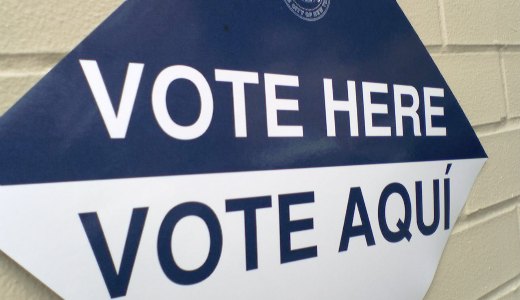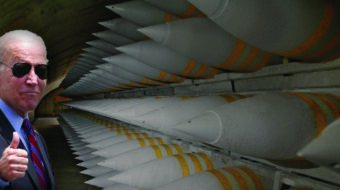
Some voters on our side of the struggle are taking a powder on the elections. They claim that President Obama raised their hopes as a candidate and let them down as a president.
They expected bold action on the economic crisis, but it didn’t happen. The stimulus didn’t go far enough. Ditto for health care legislation. The scale and pace of change has been too slow – too many people are out of work, out of affordable health care, and out of their homes.
Meanwhile, their riff goes, bloodletting continues in Afghanistan, corporations are sitting on nearly $2 trillion of idle money, profits are up, inequality is growing, and tax cuts for the wealthy are draining our treasury and driving up the national deficit.
There is truth here, but the question is: is it enough to stay home? I say no for three reasons.
To begin with the most obvious, the elections’ impact on people’s lives. Even though the size of the stimulus was inadequate and a public option was missing in the new health care law, both bills bring a measure of relief to millions of people. And as a friend of mine keeps reminding me, it may make only an inch of difference, but a lot of people live on that inch.
Which brings me to next month’s congressional elections. If the Republicans regain control of the House of Representatives, that inch of difference (things like unemployment insurance extensions, food stamps, relief for local and state governments, modest jobs and infrastructure programs, readjustment of tax policy in favor of working people, funding for education, a real fight over military appropriations for Afghanistan) will probably vanish – along with hope for more far-reaching measures.
Furthermore, “austerity” will become the watchword, the pressures to weaken Social Security and Medicare will grow, and the economic pain for working people is likely to get much worse.
A second reason to vote is a little less obvious, but you don’t have to know higher math to understand it: A Republican victory at the polls on Nov. 2 – defined as winning a majority of seats in the House – would be the opening act of a horror show, culminating in the Republican right reclaiming full dominance of Congress and the White House in 2012.
For the far right, electoral success in the current elections and then in 2012 is the eye of the needle through which it must past in order to radically transform the country to the advantage of the most reactionary section of monopoly capital and its allies, motley and dangerous as they are.
No one on their side is going to stay home on Election Day. A “no show” is a “no-no” for them. Everyone is expected to march to the polls and bring others with them.
You won’t hear of any of them scaling down the importance of the elections. Their lens is wide-angled enough to see the big picture. The claim that the two parties of capitalism are indistinguishable is a fool’s notion in their world. And they see this election and the one two years from now as a crossroads in American politics whose outcome will determine the kind of nation we will become.
Finally, a Republican victory this fall will not simply weaken the president and his party, but likely demoralize and take the wind out of the sails of the loose coalition that emerged in 2008 and after a post-election hiatus is finding its stride again, as evidenced by the Oct. 2 rally in the nation’s capital.
To believe otherwise is naïve at best. Millions will feel that the promise of 2008 evaporated in the voting booths in 2010. They may not be entirely right about that, but that is how they will feel, and people act on the basis of their feelings. The mobilization of people in the post-election period will become more difficult.
Of course, some people are so deeply cynical that nothing could persuade them to vote.
Then there are a few others who will sit these elections out for ideological reasons. They argue that participation in the two-party system spreads illusions about the Democratic Party, delaying the formation of an anti-capitalist alternative.
In their view, the elections are simply a contest between two parties with no differences of any importance; thus, it makes little, if any, difference who wins – Bush or Gore, Bush or Kerry, McCain or Obama, candidates of the right or candidates of the center and left of center.
Any even temporary and tactical alliance with the Democratic Party – well, it’s worse than the plague, to be avoided at all costs. Support for a Democratic candidate as a “lesser evil” is tantamount to craven political bankruptcy and opportunism.
What is to be done? It’s simple, say the advocates of this point of view: make a “strategic break” with the two-party system. But there is an oh-so slight hitch that serious progressive and left-thinking people can’t afford to overlook.
A “strategic break” makes sense only if millions of people and their organizations are ready to march out of the Democratic Party into a labor/people-based political party, but guess what? They aren’t.
Yes, many people stay home on Election Day, but it is not an expression of political acumen nor is it the majority. The most active layers of working people organize others to vote and vote themselves.
While many of them express dissatisfaction with the Democratic Party, it hasn’t risen to the point where they are ready to bolt it in any near term that I can envision.
Moreover, the rise of right-wing extremism reinforces this sentiment. Broad unity, not division, not attacking people’s leaders as the “super leftists” love to do (they see these leaders as the main reason that people stay put in the Democratic Party – how simple-minded) is the blood that flows through the veins of the people’s movement at this moment.
Politics is a contested, complex, and impure process. There are waves and breaks – progressive and reactionary – in continuity to be sure, but in between there are longer periods in which the struggle doesn’t soar to new heights or sink to new depths, but still is consequential to the breaks that do come.
In 2008, politics, economics and mass thinking became unhinged from their old moorings and a political turn, albeit partial, occurred. Since then the completion of this turn has become a more protracted and difficult process than many, including myself, thought.
The elections in less than three weeks, for good or bad, will mark a new phase in this process. No one with an iota of common sense will sit it out. Shoot yourself in the foot if you like, but don’t do it on Nov. 2 because the buckshot will hit the rest of us!
Photo: http://www.flickr.com/photos/robboudon/291583692/ cc 2.0

MOST POPULAR TODAY

High Court essentially bans demonstrations, freedom of assembly in Deep South

Zionist organizations leading campaign to stop ceasefire resolutions in D.C. area

U.S. imperialism’s ‘ironclad’ support for Israel increases fascist danger at home

UN warns that Israel is still blocking humanitarian aid to Gaza







Comments